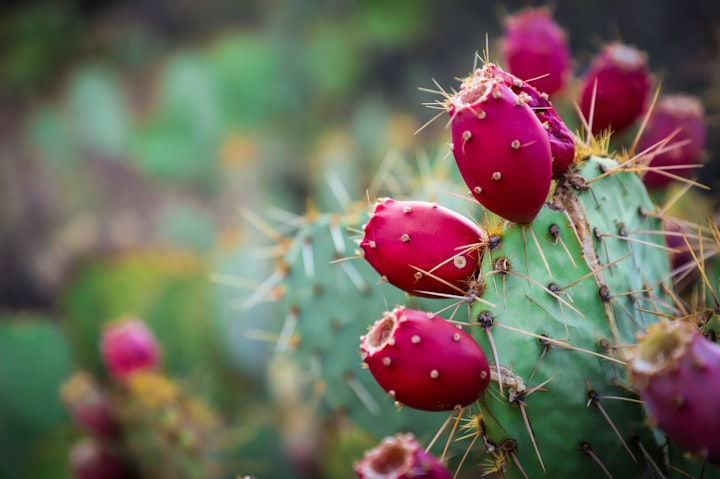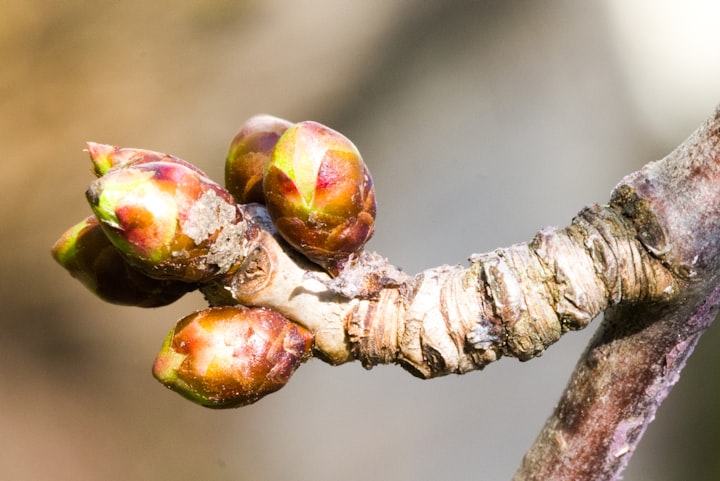
The murder and funeral were planned for tomorrow.
Carmen and Josefa had spent the summer pouring over a mix of spreadsheets, websites, and even a few reference books. They’d written to a famous advice columnist in Alaska who specialized in questions like theirs, and gotten an answer that was two parts regret and one part rage. They’d crossed every finger, prayed, danced, and strategized.
But the rain hadn’t come.
They combined their water allotments and gave up on the ornamentals, focusing solely on the food-bearing plants that grew on and over their shared fence. They’d fashioned dew-catchers, and put down absorbent mulch to keep as much water from evaporating as they could.
They’d been reported twice - once when a jealous neighbor saw the way their healthy tomatoes bore an unlikely avalanche of fruit and assumed they’d cheated or stolen someone else’s water allotment, and once when Carmen’s children’s social worker had come over for an unannounced inspection and caught sight of the blooming garden along the fence. Never mind that their yard was packed dirt and rounded gravel, without so much as a blade of grass - all any outsider could see was the abrupt riot of greenery in the middle of a hundred-year drought.
The garden couldn’t feed them, not properly. They had a robust collection of herbs, and an evolving crop of tomatoes, cucumbers, and zucchini. Rhubarb, strawberries, lettuce and radishes in the spring. Brambles of black caps and raspberries marked each end of the fence. Blueberry bushes on Josefa’s side, a carefully controlled pumpkin patch on Carmen’s. But the three trees - a McIntosh apple, a Bartlett pear, and an Italian plum - were the crown jewels, each with branches hanging over the fence.
It was the sort of food that kept a person eating, in a time when so many were being admitted to the hospital for malnutrition. The government wasn’t totally failing to feed people; they just hadn’t considered the human need for variety. Two flavors of nutritional “cookies” - individually wrapped protein bars - weren’t enough to engage a palate for a long period of time. The cookie deliveries had started a year ago, and fatigue and frustration were running high.
Carmen and Josefa ate theirs in between meals, knowing they needed the calories, but spent their lunches and dinners devouring huge salads, bowls of sautéed zucchini and herbs, and the joy of sun-warmed fruit. What they didn’t eat, they preserved, sharing as much as they could spare. Someone said Josefa’s raspberry jam, spread on a chocolate government cookie was almost enough to disguise the chalky texture, and credited her for keeping their children out of the hospital.
They’d debated, planned, hoped, and strategized, but they’d agreed to call it by the first of August: if it hadn’t rained, they’d take out a tree to save the rest of the garden. The pear tree was the youngest of the three, and hadn’t started fruiting yet. Carmen didn’t want to forego applesauce and plum preserves for the promise of something that might not ever come.
Still, it felt like cutting off one of her own feet.
Josefa had a plan that involved chanting, prayers, saving a few round slices of the narrow trunk for making jewelry, and symbolically burying a branch. Carmen’s job was the eulogy. After the kids were asleep, she came out to lie in the hammock and brainstorm, the pear tree directly in view between her feet. The only thing she felt was a tight, cottony stubbornness in her chest - I don’t wanna, I don’t wanna, I don’t wanna chop it down.
Across the way, she heard Josefa’s back door slide open and the sound of her sandals crunching across the gravel. Josefa stopped somewhere close to the fence. Carmen heard the hiss and pop of a can being opened, and then the splash of what she was sure was beer against the ground. Josefa followed the offering with a song, crooning in low, soft Spanish. Carmen blinked back tears as the familiar lullaby spilled over the garden. Once the song was done, she heard Josefa say, “Descanzo, querido árbol.” Rest, dear tree.
The next morning, before the sun reached its height, Carmen met Josefa on the other side of the fence with her chainsaw and a single sheet of paper stuffed into her back pocket. Josefa was already there, sitting cross legged on the ground, waiting with her eyes closed. Carmen laid the saw down and pulled her eulogy out. Josefa had insisted the tree be alive to hear what it had meant to them.
“We gather here today,” Carmen began, “to give thanks for the life of this pear tree. Though we weren’t able to taste its fruit, it gave us a lot of happiness as we watched it grow. Right now, they want us to believe that everything is dying. But this little pear tree proved that even in the worst of times, you can’t stop what wants to live. Which is why it’s so horrible to have to make the decision to cut it down.” She paused to take a shaky breath.
“We shouldn’t have to,” she continued. “We shouldn’t have to decide what lives or dies. There should be enough water for everything. It didn’t have to be this way.” Her voice cracked. At her feet, Josefa wept silently. “We could’ve chosen otherwise. We didn’t. And I’m sorry, little tree. I’m so sorry.”
After a long moment of silence, Josefa got to her feet and placed her hands on the tree’s branches, singing a wordless melody, beautiful, haunting, and full of grief. Though the tears continued to roll down her cheeks, her voice was clear and strong. She sang and sang, and finally touched her forehead to the tree’s uppermost branch and stepped away.
Carmen picked up the chainsaw.
Weeks later, in the bright, shadowless spot where the tree had been, where a wooden medallion hung from a thin chain around a fence post, they planted their first cactus - a prickly pear. Carmen hoped they'd get to try its fruit.
About the Creator
Dane BH
By day, I'm a cog in the nonprofit machine, and poet. By night, I'm a creature of the internet. My soul is a grumpy cat who'd rather be sleeping.
Top Story count: 17
Check out my Vocal Spotlight and my Vocal Podcast!






Comments
There are no comments for this story
Be the first to respond and start the conversation.